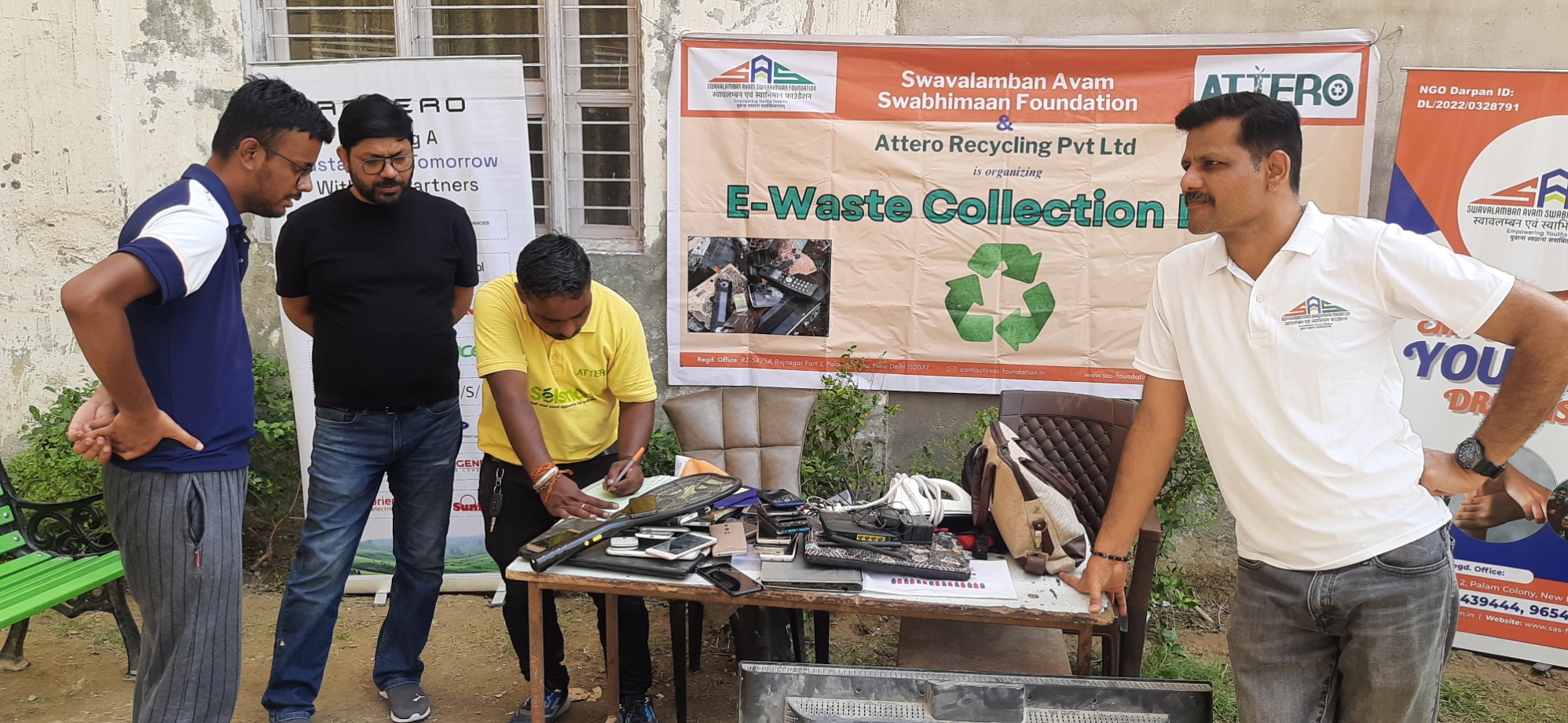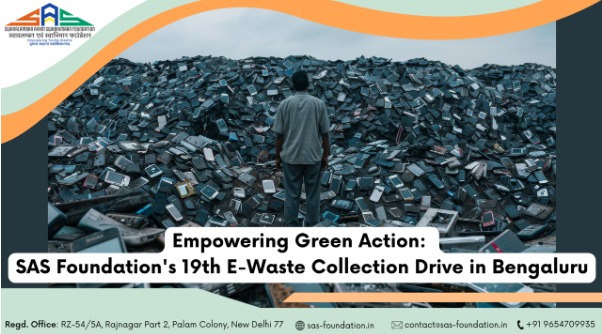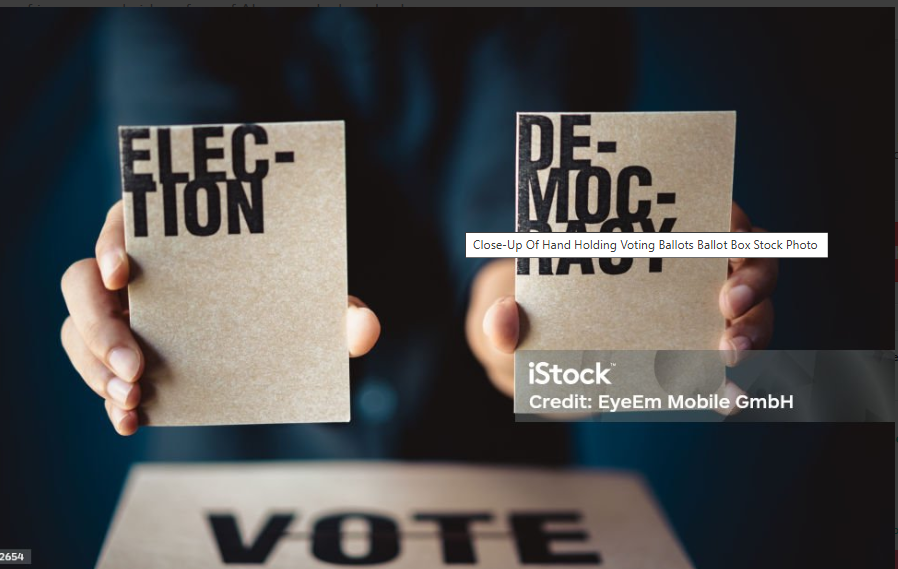Turning Trash into Treasure: How E-Waste Recycling Fuels Community Development and Economic Growth
In an era dominated by technology, where new devices continuously replace the old, the world faces an escalating challenge—electronic waste (e-waste). From smartphones to televisions, laptops to washing machines, electronic products that once symbolized innovation now pose a growing environmental threat once they reach the end of their lifecycle.
But here’s the good news: what we see as “waste” is actually a goldmine of opportunity. For communities willing to act, e-waste recycling is more than just an environmental responsibility—it is a catalyst for economic development, job creation, and sustainability.
At Swavalamban Avam Swabhimaan Foundation (SAS Foundation), we believe in transforming social challenges into pathways of empowerment. Through awareness, partnerships, and grassroots initiatives, we are showcasing how responsible e-waste management can benefit not just the planet, but local economies too.
📈 The E-Waste Challenge: A Crisis in the Making
According to the Global E-waste Monitor, the world generated over 53.6 million metric tonnes of e-waste in 2020, and this number is projected to grow rapidly. In India alone, over 3.2 million metric tonnes of e-waste is produced annually, much of which remains uncollected or is processed informally, leading to hazardous environmental and health consequences.
Toxic substances like lead, cadmium, and mercury leak into soil and water, affecting not just the environment but human health too. Informal recycling practices, often undertaken without protective gear, expose workers—especially women and children—to dangerous conditions.
🌍 A New Perspective: E-Waste as an Economic Resource
What if instead of treating e-waste as a problem, we saw it as a resource?
Electronic devices contain valuable and recoverable materials such as gold, silver, copper, aluminum, and rare earth metals. Proper recycling not only prevents environmental damage but extracts economic value from discarded electronics—fueling local economies and creating circular value chains.
Here’s how communities benefit:
🔧 1. Job Creation Through Recycling Operations
One of the most immediate benefits of setting up e-waste recycling initiatives is employment generation.
- Skilled and semi-skilled workers are needed for tasks like collection, dismantling, segregation, and processing.
- Certified recyclers can employ technicians, logistics personnel, and data security experts.
- Formal recycling hubs create safe, dignified, and sustainable jobs—particularly for youth and women in low-income areas.
According to a recent UN report, for every 10,000 tonnes of e-waste processed, over 280 jobs can be created in formal recycling systems. That’s 280 livelihoods created from what was once considered garbage.
💰 2. Revenue Generation from Valuable Recovered Materials
Electronic waste isn’t just trash—it’s treasure.
Devices contain precious metals like gold, palladium, and platinum, along with other recyclables such as copper and plastics. Efficient recycling methods allow these materials to be recovered and sold in secondary markets, generating significant revenue.
- A tonne of mobile phones can yield more gold than a tonne of mined gold ore.
- Extracted metals and components can be resold to manufacturers, contributing to import substitution and boosting domestic industries.
This not only makes recycling economically attractive but also reduces dependency on raw material imports, aligning with India’s Atmanirbhar Bharat vision.
🌱 3. Support for Local Businesses and Green Entrepreneurs
E-waste recycling opens up a new domain for green entrepreneurship.
- Micro-businesses can emerge around collection, logistics, refurbishing, and resale.
- Entrepreneurs can build services for repair, upcycling, or responsible disposal.
- NGOs and social enterprises can offer training and capacity building, especially in underserved regions.
Such initiatives support local businesses, promote financial independence, and create a new category of eco-friendly entrepreneurship. These businesses not only generate income but also encourage sustainable consumption habits.
💡 4. Savings on Municipal Waste Management
E-waste that ends up in landfills or is burned puts pressure on urban waste management systems and budgets. By adopting recycling mechanisms, municipalities can:
- Reduce landfill volumes and the costs of solid waste disposal.
- Minimize toxic emissions and pollution cleanup.
- Redirect resources toward health, infrastructure, and other community needs.
In short, recycling e-waste is cheaper and smarter in the long run.
🔁 5. Advancing the Circular Economy
By recycling e-waste, communities participate in the circular economy model—a system that minimizes waste and maximizes resource use. It moves away from the linear “take-make-dispose” model and towards a sustainable cycle of reuse, repair, and recycling.
This approach:
- Extends the lifespan of electronics
- Promotes sustainable production and consumption
- Fosters innovation in materials recovery and product design
Communities that embrace this model are future-ready and attract green investments, grants, and global attention.
💬 The SAS Foundation Experience
At SAS Foundation, our e-waste initiatives have shown tangible results. Through partnerships with organizations like Attero, and awareness drives across cities like Delhi, Faridabad, Bengaluru, Mumbai, and Gurgaon, we’ve:
- Collected over 2 tonnes of e-waste in a single year
- Educated thousands about safe disposal practices
- Engaged youth and women in eco-volunteering
- Reduced the environmental footprint of dozens of residential societies
Every drive we organize doesn’t just reduce waste—it builds community ownership, empowers volunteers, and inspires green thinking.
📢 Call to Action: What Can Your Community Do?
1. Educate and Raise Awareness
Conduct workshops, school campaigns, and RWA sessions on e-waste and its value.
2. Set Up Collection Points
Partner with certified recyclers to install bins and organize monthly pickups.
3. Support Local Recyclers and Refurbishers
Buy-back schemes, repair hubs, and reuse markets can be powerful local boosters.
4. Encourage Green Jobs and Training
Work with NGOs to skill youth and women in handling, refurbishing, and recycling.
5. Advocate for Policy Support
Push for local policies that promote formal recycling, tax incentives, and producer responsibility.
🔗 Stay Connected, Stay Inspired
Want to dive deeper into this topic and other sustainable development initiatives?
📩 Subscribe to our newsletter on LinkedIn: https://lnkd.in/gfeaFC2v
Here, you’ll find:
- Success stories from our e-waste drives
- Insights from sustainability experts
- Tips on how to organize drives in your own community
Let’s reimagine waste as wealth, and empower our communities through green action.
🌟 Final Thoughts
E-waste recycling is not just a solution to a problem—it’s a launchpad for social innovation and economic resilience. By embracing it, we turn pollution into potential, and discard into dignity.
At SAS Foundation, we’re proud to be part of this movement—and we invite you and your community to join us in creating a cleaner, greener, more prosperous tomorrow.
Because real change begins where awareness meets action.










